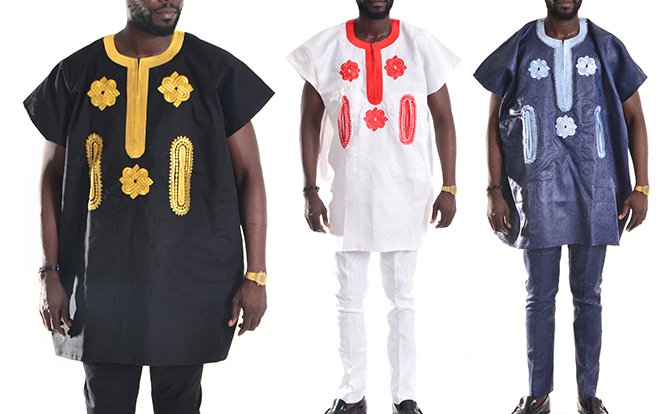Dansiki or Dashiki is a traditional wear of the Yoruba people of Southwest Nigeria. The word ‘dansiki’ is borrowed from Hausa ‘dan ciki’ which literally means underneath. It is a loose-fitting, pullover top usually sewn from different colorful African fabrics. It often comes with patch pockets and embroidery at the neckline and cuffs.
This wear can be sewn with ankara, adire, guinee, and other African fabrics. It is mostly in the form of a short agbada; a flowing robe which is another popular Yoruba traditional wear. Dansikis are short sleeves and sleeveless tunic worn by Yoruba men back in the days. These days, it is unisex to wear and also adorned by people of all ages. Yoruba traditional rulers and chiefs also adorn this wear both indoor and for occasions. Traditionalists such as chief priests are not left excluded as they adorn it in style.
Various Ways of Adorning Dansiki
Dansiki can be adorned in different ways. It can be adorned with a pair of trousers which are called ‘sokoto’ by the people. The kings and chiefs wear Dansiki this way with their caps (fila) on their heads and beads on their neck and hands as in royalty and chieftaincy.
It can also be adorned with a short referred to as ‘kembe’ by the people which is always very big. It is adorned by the men this way as they go about their day-to-day activities. Men wear it to their farms, palm-wine joints, or when relaxing with friends especially when they are playing ‘ayo’ game. They can move their limbs as quick as possible because of how the wear is sewn.
Another way it can be adorned is by the introduction of western wears such as denim. Styled Dansiki with embroidery and tunic is mostly used this way. Dansiki with tunic and embroideries comes in many colors and makes one really stylish. Dansiki, in vogue, is adorned by ladies with a denim bum-short or without. Children are not left as they adorn this wear in style too.
Dansiki has since been adopted by the westerners and it appeared in the American fashion scene as far back as the 1960s when it was embraced by the black pride and white counter-culture movements. Similar styles of Dansiki are also seen in some West African countries such as Mali, Senegal, Ghana and so on. Dansiki is no longer worn by the Yoruba people only but by all.

